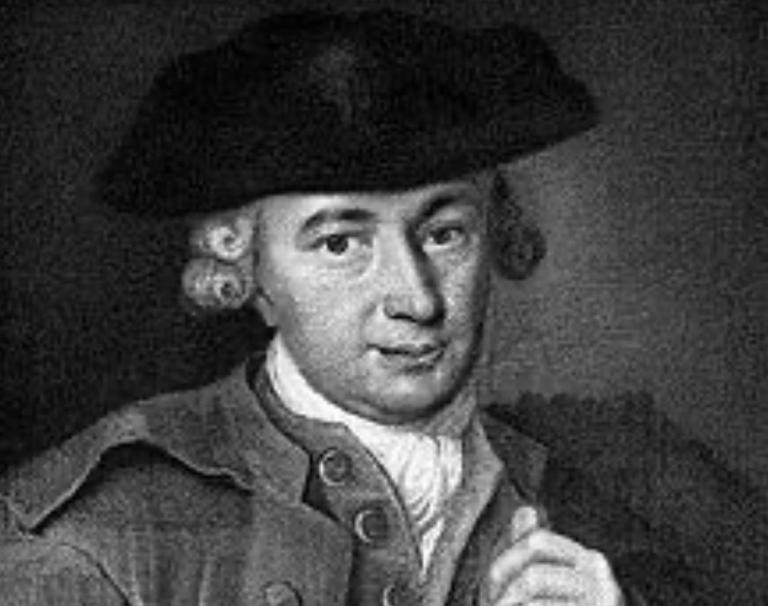Yesterday I blogged about the first complete English translation of the London Writings by Johann Georg Hamann, translated from the German by the esteemed Australian theologian John W. Kleinig (Ph.D., Cambridge) and edited by yours truly. I want to tell you more about it, give you some samples from the book, and explain why it is so important.
These journals, written during and immediately after his spiritual awakening, were not published during Hamann’s lifetime, but circulated only among his friends and family. After he died, portions of them were printed–especially from “Thoughts on the Course of My Life,” the account of his conversion that I excerpt below–and received a wide audience. C. F. W. Walther, the founder of the Lutheran Church Missouri Synod, printed the account in the church’s journal Lehre und Wehre. But the entirety of the book, including its key section “Biblical Meditations of a Christian,” was not published until Josef Nadler’s edition of Hamann’s complete works, 1949-1957. The first single-volume edition of the London Writings in the original German did not come out until the theologian Oswald Bayer and Bernd Weissenborn came out with a critical edition in 1993, which was the basis of this current translation into English. But the London Writings is still largely new to readers today.
“Thoughts on the Course of My Life,” the most well-known section, begins with the 28-year-old Hamann recounting his early life, his education, his friendships, and his travels. He writes with a painful openness, and what emerges is a self-portrait of a talented young man who has no idea what to do with his life, is proud but feels inferior to just about everyone, and who is acutely aware of his personal shortcomings and failures. Goethe and Kierkegaard would write fictionalized journals like this–probably following the model set by Hamann–but the “Thoughts,” for all of their self-loathing combined with hyper-awareness, reminds me most of Dostoevsky’s Notes from Underground.
After he drops out of the University of Konigsberg, Hamann goes to Riga in present-day Latvia, where Johann Christoph Berens, one of his circle of bright young exemplars of Enlightenment rationalism–including Immanuel Kant–lives with his family. Berens’ father, a wealthy merchant, gives Hamann employment. He is to go to London to meet with officials and the Russian ambassador to negotiate what is apparently a trade deal. Hamann is glad to get a free trip to England, but he is totally unsuited for such practical business. His meeting is an embarrassing debacle, but he stays in London where he spends all of his money, falls into debt, and makes a friend who leads him into a life of debauchery.
After breaking with his friend, he boards with a Christian couple who give him a place to stay. In his destitution and failure, he picks up an English Bible and starts to read it. Here is how he describes what happened. . . .
From J. G. Hamann, “Thoughts on the Course of My Life,” in London Writings, trans. John W. Kleinig (Evansville, IN: Ballast Press, 2021), pp. 288-289:
The further I went, the newer it became for me, the more divine was my experience of its content and effect. I forgot all my books about it; I was even ashamed that I had ever compared them to the book of God , had ever set them side by side, and had ever preferred any other book to it. I found the unity of the divine will in the redemption of Jesus Christ, so that all history, all miracles, all the commandments and works of God converge at this central point, in order to lead the human soul out of the slavery, bondage, blindness, folly, and death of sin to the greatest happiness, the highest blessedness, and a reception of such good gifts that their greatness, when they are revealed to us, must shock us more than our own unworthiness or the possibility of making ourselves worthy of them.
I recognized my own offenses in the history of the Jewish people. I read the story of my own life and thanked God for His forbearance with this His people, because nothing but such an example could justify a similar hope for me. Above all else, I made an extraordinary discovery in the books of Moses that in some cases the Israelites, however uncouth a people they may appear to us, sought from God nothing but what God wanted to do for them. They acknowledged their disobedience just as vividly as any penitent sinner and also forgot their penitence just as quickly. Yet in the anguish at their sin they called for nothing but a Redeemer, an Advocate, a Mediator, without whom they could not rightly fear Him, nor rightly love Him.
In the midst of these reflections, which seemed rather mysterious to me, I read the fifth chapter of the Fifth Book of Moses on the evening of 31 March and fell into deep meditation. I thought about Abel and God’s word about him: “the earth had opened its mouth to receive your brother’s blood.” — — I felt my heart thump, I heard a voice groaning and wailing in its depths like the voice of blood, like the voice of a murdered brother, who wanted to avenge his blood, even though I, at times, did not hear it and continued to shut my ears to it — — It said that this was what made Cain restless and unable to escape. At once I felt my heart flowing, it poured itself out in tears, and I could no longer — — I could no longer hide from God that I was the killer of my brother, the murderer of His only begotten Son. Despite my great weakness, despite the long resistance which I had, until now, put up against His witness and His tender touch, the Spirit of God kept on revealing to me, still more and more, the mystery of divine love and the benefit of faith in our gracious, only Savior. . . .
Praise God, my heart felt more at rest than ever before in my life. In the moments when depression wanted to arise, I was overwhelmed with a sense of comfort, the origin of which I cannot credit to myself, and which no one is able to pour into his neighbor so abundantly. I was shocked by its overflow. It swallowed up all fear, all sadness, all mistrust, so that I could not find any trace of them in my soul any longer.
I’ll pick up the story tomorrow.
Also available directly from the Ballast Press website.
The cover portrait is dated 1757, when Hamann was 27, one year before the composition of the London Writings. The original painting was in Königsberg, Stadtgeschichtliches Museum, which was destroyed in a bombing attack in World War II. The photograph is from Paul Ortwin Rave, Das Geistige Deutschland im Bildnis: Das Jahrhundert Goethes, Berlin 1949, via Wikimedia Commons, and is in the Public Domain.














